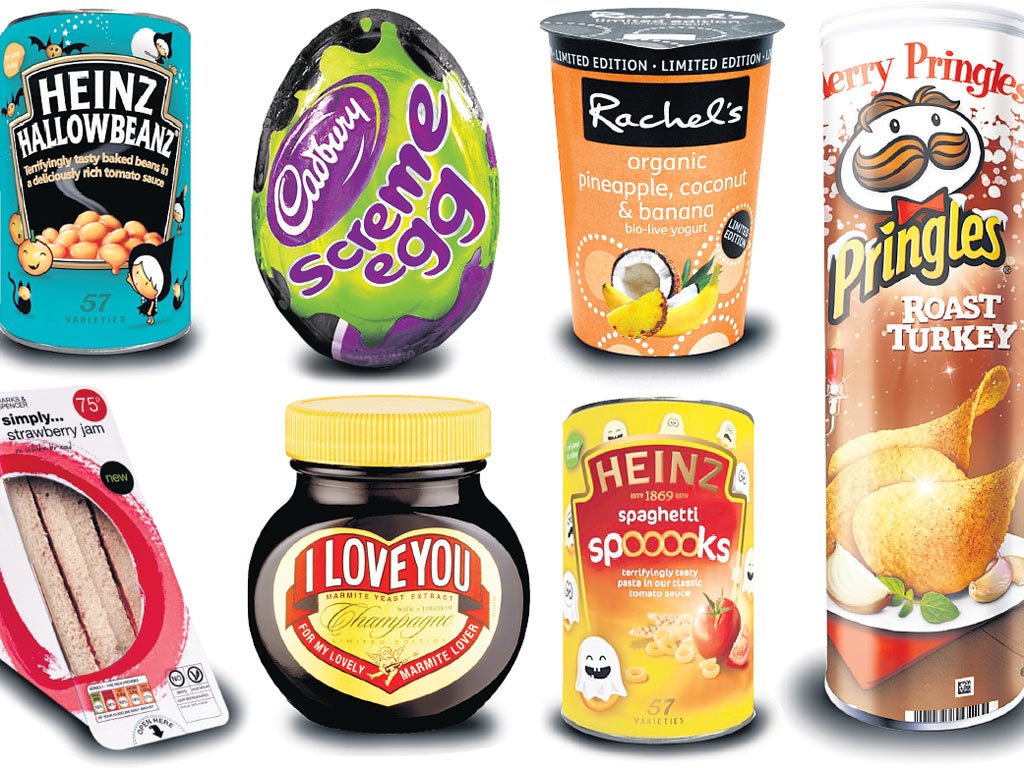Crunch them while you can
Are limited-edition products such as Cadbury's Screme Eggs and champagne Marmite top treats for discerning palates – or just tasty bits of marketing? Samuel Muston reports

About 40 metres from where I am sitting, across the atrium and on the far wall of our office canteen, is a row of open-fronted fridges. Between the shelves carrying traffic-light jellies and fruit salads in shiny boxes are the sandwiches. Next to the coronation chicken is an eye-catching triple-decker white-bread number, which, the packaging announces, contains egg and cress, cheese and tomato, and savoury cheese. As if the description of the bounty within was not siren-call enough, underneath, in block capitals, are written the words "LIMITED EDITION". Yes, this is a limited-edition cheese sandwich. And, yes, it – or at least sandwiches of the same "edition" – seem to have been on sale for some months.
It says something of our familiarity with the notion of limited-edition produce that although this amuses, it doesn't particularly surprise. While the products that use the term are by definition limited, the notion itself is pretty near ubiquitous. The range of limited-edition foods is staggering.
Some are a recurrent, comforting presence, which it's easy to forget are produced for any special reason, such as Cadbury's Easter Creme Eggs. Many are disconnected from time or space, such as Tesco's lasagne sandwich, which kicked palates into touch in 2010 with a filling of beef, cheddar, ricotta mayonnaise, and pasta. Some are deliberately odd headline-grabbers such as the Wimbledon sandwich – yet another Tesco creation – which eschewed cheese and ham for sliced fruit, clotted cream and jam on white bread, similar to the M&S jam sandwich (75p). But the real best-selling creations tend to pop up in September or October. For, as every marketing man knows, the peak time for limited-edition foods – even more than Christmas – is Hallowe'en.
To celebrate the day of the dead, you can now pick up limited-edition sour scream [sic] and onion Pringles, which are the same animal in a different can (they have also produced a turkey version at Christmas). Pumpkin-flavoured bagels from the New York Bakery Company. Heinz Hallowbeanz, which, the packaging declares, are "terrifyingly tasty" and, as others are likely to point out, "shockingly similar" to the standard product. While Cadbury plays to its strengths with its Screme Eggs, which are the same as the Easter version but with their innards dyed snot-green.
Why is it, then, that so many manufacturers are jumping on the limited-edition bandwagon? "It's a form of innovation on the cheap," says Rachel Barnes, insight editor at Marketing magazine. "For a brand to invest in a new flavour it takes time, market-testing and investment. It's cheaper and less risky to bring out a limited-edition flavour or premium packaging, especially in a recession. You keep the same factories essentially doing the same thing but simply tweak things a little to play on events like Hallowe'en."
As a sales strategy it does seem remarkably successful. "Our limited-edition yoghurts usually yield an increase in incremental sales of around 65 per cent," says Andrew Curzon, marketing manager at Rachel's Organic, which brings out a new limited-edition yoghurt every three months. "It's also a way of road-testing new flavours, which, if popular, can then go on general sale, like with our gooseberry yoghurt."
It doesn't always go exactly to plan, though. A consignment of limited-edition St George's Cross Mars bars, which accidentally found its way to Germany at the time of the 2010 World Cup, failed to move the people of Berlin to part with their euros. "Even some British retailers had problems with the St George Mars bar," Barnes says. "Convenience-store owners said customers found them odd, and quite a few were left unsold. There is a danger the term may get devalued by its proliferation. But on the whole, people go for it."
We may, as a nation, draw the line at patron saints on confectionery – but we go pretty much potty for everything else. Just what is it, then, that accounts for this rush to get our limited-edition produce to the tills? "We all like to think we are getting a premium, rarer product. Marmite is a case in point. It made Guinness Marmite in 2007, then went further upmarket with a champagne version for St Valentine's Day in 2008. They sold hundreds of thousands of each version," she says. "At the very heart of it all, it comes down to that human desire to have something exclusive, something that others possibly won't have." Which all sounds very reasonable and understandable, but a limited-edition cheese sandwich? Really?
Join our commenting forum
Join thought-provoking conversations, follow other Independent readers and see their replies
Comments
Bookmark popover
Removed from bookmarks